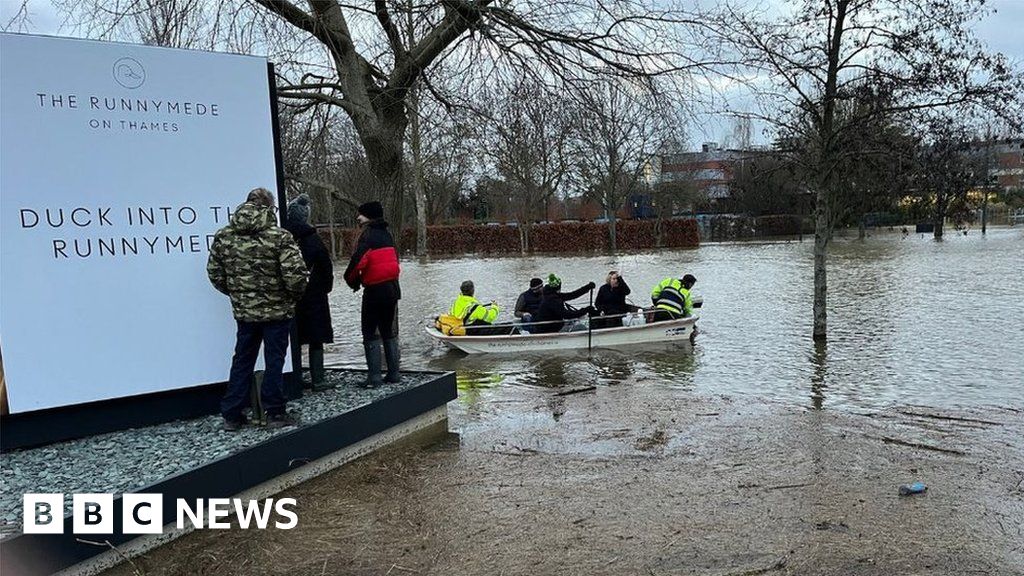- By Christian Fuller & Tanya Gupta
- BBC News, South East
Image source, BBC/Adrian Harms
Staff at the Runnymede Hotel, which is on the banks of the river, were ferried by boat
Homes, businesses and roads have flooded in Surrey as the Thames continued to rise, with water inches away from levels seen 10 years ago.
Almost the whole stretch of the river in Surrey is subject to warnings, affecting areas including Chertsey, Walton, Sunbury, Molesey and Egham.
The Environment Agency said floods were on a par with those in 2013 but not expected to reach levels seen in 2014.
One Staines-upon-Thames resident said: “It’s a repeat performance of 2014.”
Ian Swinglehurst said the river there was about four inches (10cm) away from 2014 levels, with water levels continuing to rise even though heavy rain had stopped.
- At Chertsey Lock (downstream), the Thames was 4.5m – 10cm lower than levels recorded on 11 February, 2014
- Penton Hook (downstream) was 4.92m – 12cm lower than levels a decade ago
- Penton Hook (upstream) was 1.37m compared with 1.4m in February 2014
- Chertsey Lock (upstream) showed a 16cm difference
Mr Swinglehurst attributed rising river levels to run-off from fields and hills but also to the Environment Agency’s use of the Jubilee River flood relief scheme, which diverts water in Berkshire and returns it to the Thames at Datchet.
Carl Douglas, whose boat-building business at Laleham Reach has flooded, also blamed the Jubilee River, saying floods came in 2003 and 2014 after it came into use in 2002.
He said the Thames was no longer a natural river and needed dredging.
However, an Environment Agency spokesman denied the claims and said: “It is not true that the Jubilee River results in increases in downstream water levels, putting those communities at greater risk.
“After the 2003 flood, further river modelling was completed to re-examine any impacts from the Jubilee River on downstream communities.
“The results showed that there would be very little difference in the flows at Windsor, and the downstream water levels, whether or not the Jubilee River was operated.”
Mr Douglas, a chartered engineer and an expert in fluid dynamics, said his workshop full of electrical machinery had been flooded four times in 20 years and water was now 10 inches deep.
He said when this year’s flooding subsided, he would be left with oil, sewage, water and filth.
Nearly the whole of the Thames in Surrey is subject to flood warnings
In Runnymede, the A308 between Egham and Windsor plus the Magna Carta meadow have flooded.
Michelle Maxwell-Roberts, who waded through waist-high water on the A308 to drop her children at school, said: “We’re trying to keep life as normal”.
She told BBC Radio Surrey: “We’ve been at our house for 17 years. Luckily, [the water] has never come into the house. We’re resilient and there are people a lot worse off than us.”
The A308 between Egham and Windsor and Magna Carta meadow is flooded
Tom Gray, who also waded through water with his family on the A308, said: “Walking is the only way now. I’ve known the river for 35 years, and this is the third time we’ve been through this.”
Hotel staff at the flooded 205-room Runnymede Hotel, which sits on the river bank, were ferried by boat to the site earlier.
In a statement, the hotel said: “The safety and wellbeing of everyone at the hotel is our number one priority and steps have been taken to accommodate guests who’ve been impacted.”
Image source, Hannah Rush
Chertsey Bridge is closed and nearby roads are flooded
Residents have told the BBC the scheme has been repeatedly discussed since the 1990s but never implemented.
Runnymede and Weybridge MP Ben Spencer said he had been pushing for the scheme to be implemented as soon as possible.
“It is the biggest scheme the Department for Environment Food and Rural Affairs have ever done,” he said.
In Chertsey, where the bridge is closed, residents have said they were unable to get sandbags.
Image source, BBC/Adrian Harms
Runnymede and Weybridge MP Ben Spencer said he was pushing for the River Thames Scheme to be implemented
Runnymede councillor Sam Jenkins said: “We’ve made a small number of sandbags available at the council. These are finite in number.
“It is important to emphasise that, because the council strategy at the moment is to protect life over property.
“If the Thames is still rising and you feel that your property is unsafe, my advice is to call the council’s emergency line.
“If it’s unsafe to stay in your property, it’s likely that the best way forward is to evacuate the property rather than protect it with sandbags and the council will give you more info about how that can happen.”

William Turner is a seasoned U.K. correspondent with a deep understanding of domestic affairs. With a passion for British politics and culture, he provides insightful analysis and comprehensive coverage of events within the United Kingdom.








